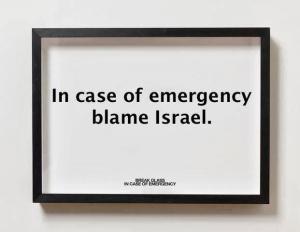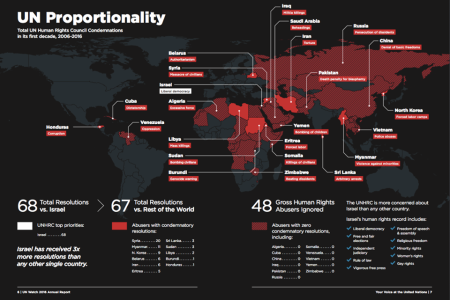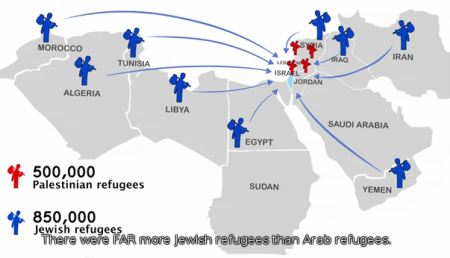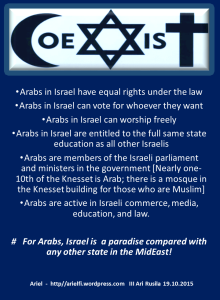 BICOM reports that the executive board of UNESCO (United Nations Educational, Scientific, and Cultural Organisation) officially on 18th Oct. 2016 approved a controversial motion which failed to recognize any Jewish connection to the Temple Mount in Jerusalem. The executive board ratified the resolution, which was approved last Thursday by member states in Paris. The vote was 24 in favor (including Iran and Sudan), 6 against (including USA, UK, Germany, Netherlands), 26 abstaining, and 2 absent.
BICOM reports that the executive board of UNESCO (United Nations Educational, Scientific, and Cultural Organisation) officially on 18th Oct. 2016 approved a controversial motion which failed to recognize any Jewish connection to the Temple Mount in Jerusalem. The executive board ratified the resolution, which was approved last Thursday by member states in Paris. The vote was 24 in favor (including Iran and Sudan), 6 against (including USA, UK, Germany, Netherlands), 26 abstaining, and 2 absent.
The original resolution, which six countries including the UK opposed, was submitted by the Palestinian delegation with the support of Egypt, Algeria, Morocco, Lebanon, Oman, Qatar and Sudan. It alleges “Israeli escalating aggressions and illegal measures… against the freedom of worship and Muslims’ access to their Holy Site Al-Aqsa Mosque/Al-Haram Al Sharif”.
Although the motion acknowledges that Jerusalem is holy to the three monotheistic religions, the section dealing specifically with the Temple Mount says the site is sacred only to Muslims, failing to acknowledge its significance to Jews. It refers to the Western Wall, the world’s most significant Jewish prayer site, by the Arabic term Buraq Plaza, while quotation marks pointedly accompany the phrase “Western Wall”, the Jewish name for the site.
Following Thursday’s vote, the motion was condemned by leaders across Israel’s political spectrum, who often accuse the UN of an institutional bias against Israel. The Director-General of UNESCO, Irina Bokova also signalled her disappointment at Thursday’s vote, saying: “The heritage of Jerusalem is indivisible, and each of its communities has a right to the explicit recognition of their history.”
Israel’s Ambassador to UNESCO Carmel Shama-Hacohen said: “We have moved forward a step-and-a-half toward dismantling the automatic majority that the Palestinians and the Arab states have against Israel.”
 UN Watch is a non-governmental organization based in Geneva whose mandate is to monitor the performance of the United Nations by the yardstick of its own Charter. UN Watch condemned UNESCO’s “historical revisionism” which erases Jewish and Christian ties to Jerusalem and casts doubt on the connection between Judaism and the ancient city’s Temple Mount and Western Wall. At the same time, UN Watch said the inflammatory text’s failure to obtain a majority was a moral victory. The amount of countries abstaining increased by seven from the 17 who supported a similar text in April, with France, India, Argentina, Spain, Sweden, Sri Lanka, Guinea and Togo shifting their votes from yes to abstain.
UN Watch is a non-governmental organization based in Geneva whose mandate is to monitor the performance of the United Nations by the yardstick of its own Charter. UN Watch condemned UNESCO’s “historical revisionism” which erases Jewish and Christian ties to Jerusalem and casts doubt on the connection between Judaism and the ancient city’s Temple Mount and Western Wall. At the same time, UN Watch said the inflammatory text’s failure to obtain a majority was a moral victory. The amount of countries abstaining increased by seven from the 17 who supported a similar text in April, with France, India, Argentina, Spain, Sweden, Sri Lanka, Guinea and Togo shifting their votes from yes to abstain.
The resolution
The resolution was drafted by the Palestinians but officially submitted by Sudan’s genocidal regime together with human rights abusers Algeria, Egypt, Lebanon, Morocco, Oman, and Qatar.
Notable features of the text according UN Watch :
-
The resolution “decries,” “condemns,” “deplores” and “deprecates” a long list of alleged Israeli infringements of Palestinian rights. The text calls Israel “the Occupying Power.”
-
The text omits any mention of the hundreds of violent Palestinian attacks against Jews in Jerusalem, organized Palestinian attempts to terrorize Jews visiting Jewish holy sites in the city, or incitement to such attacks by the Palestinian Authority and Hamas
-
The decision “strongly condemns” the alleged “escalating Israeli aggressions and illegal measures” against “the freedom of worship and Muslims’ access to their Holy Site Al-Aqṣa Mosque/Al-Ḥaram Al-Sharif”
-
The text “firmly deplores” the “continuous storming of Al-Aqṣa Mosque/Al-Ḥaram Al-Sharif by Israeli right-wing extremists and uniformed forces,” and calls on Israel to stop “provocative abuses”malaysia
-
The resolution refers to the Temple Mount only with the Islamic and Arabic names of “Al-Aqsa Mosque/Al-Haram Al-Sharif.”
-
The Western Wall is described using scare quotes as “Western Wall Plaza”, to denote disbelief (Arts.16, 18); other Israeli sites are described as the “so called Liba” and “so called Kedem Center.” (Art. 16)
-
The resolution describes the sacred Jewish sites of the Tomb of Rachel in Bethlehem and Hebron’s Tomb of the Patriarchs (revered as the burial place of Abraham, Isaac and Jacob) as “two Palestinian sites.” The text “deeply regrets” Israel’s refusal to remove these sites from its national heritage list.
-
The resolution removes the April text’s wild conspiracy charge that Israel was “planting Jewish fake graves” (Art. 14 of April 2016 resolution) in Muslim cemeteries.
-
A major story today is the decision of France to abstain. With UNESCO based in Paris, the French government’s strategy has traditionally been to distinguish itself as a leading figure in the Arab-led anti-Israel bloc. In 2011, France aggressively lobbied against the U.S. and Israel for UNESCO to admit “Palestine” as a member, a catastrophic decision that crippled UNESCO’s finances as Washington cut funding. In 2012, French voting was more anti-Israel than even the regimes of Syria, Russia and Venezuela. It would seem, however, that the outrage generated from its April support for such a rabid text prompted French leaders to express regret, influencing today’s policy virage.
“It was a victory for terrorism.”
Hillel Neuer, executive director of UN Watch, on the #UNESCO #Jerusalem vote | TV interview on i24News:
and more
UN bias
“The Arab States do not want to solve the refugee problem. They want to keep it as an open sore, as an affront to the United Nations and as a weapon against Israel. Arab leaders don’t give a damn whether the refugees live or die.” – Alexander Galloway, director of UNRWA in Jordan, 1952
Unfortunately UNESCO is only the latest example about UN bias against Israel. Despite being the only democracy in the Middle East, Israel routinely faces more criticism and condemnation at the United Nations than any other country, including those that systematically kill their citizens or deny them the most basic of human rights. Even today, both the General Assembly and Security Council continue to pass one-sided resolutions that single out and condemn the Jewish State. Additionally, an overwhelmingly powerful bloc led by the Arab nations promotes a narrow and slanderous agenda meant to isolate Israel that has met little resistance.
 Israel was the only country in the world singled out as a violator of “health rights” during the UN World Health Organization’s (WHO) annual assembly in May 2015. Although Israeli hospitals provide health care for injured Syrians and Palestinians daily, the WHO decided to turn a blind eye to health crises in Yemen, Saudi Arabia, Syria, Iran, Iraq, Libya, or North Korea, and instead single out Israel as a major violator of health rights.
Israel was the only country in the world singled out as a violator of “health rights” during the UN World Health Organization’s (WHO) annual assembly in May 2015. Although Israeli hospitals provide health care for injured Syrians and Palestinians daily, the WHO decided to turn a blind eye to health crises in Yemen, Saudi Arabia, Syria, Iran, Iraq, Libya, or North Korea, and instead single out Israel as a major violator of health rights.
The UNHRC (UN Human rights agency) closed their month-long session on March 24, 2016, by proclaiming Israel the most egregious violator of human rights in the world: issuing five council resolutions on Israel and only one each on the human rights situations in Syria, North Korea, and Iran. Frequent human rights violators such as Saudi Arabia and China were not mentioned in a single resolution. The most egregious example of anti-Israel bias at the UNHRC is the yearly discussion of agenda item 7. Agenda item 7 mandates that at each UNHRC session, Israel’s record of human rights must be debated. No other country in the world has a yearly reoccuring agenda item dedicated to it.
The best example about UN bias might be UNRWA; some background about this in appendix below.
In his speech to open the 61st General Assembly of the United Nations in September 2006, then-Secretary General Kofi Anan admitted that Israel is often unfairly judged by the international body and its various organizations. “On one side, supporters of Israel feel that it is harshly judged by standards that are not applied to its enemies,” Annan said. “And too often this is true, particularly in some UN bodies.” (Source: Jewish Virtual Library )

Appendix: UNRWA – the never-ending mission
At least two aspects explain why there are still Palestinian refugees after more than six decades:
- First is Arab leaders’ recalcitrance to accept their brethren and refusing to absorb the Palestinian refugees.
- Second the United Nations created a separate agency – UN Relief and Works Agency (UNRWA) – with unique principles and criteria.
Between 1930 to today, we probably have 60 million+ people around the world that have seen forced transfer from their homes as a result of conflict, many of these at the hands of terribly egregious aggressors. One agency, the UNHCR (UN Refugee Agency) has handled nearly all of these refugees. Its goal is to as quickly as possible resettle these refugees in new places, and move on to the next disaster unfolding.

Related to the Israeli-Arab conflict. Between 1948 and 1967, some 800,000 Palestinian Arabs displaced and 800,000 Jews displaced out of Arab countries. From the start, the Palestinians were dealt with differently than all other refugees. While all others came under the administration of a series of global organizations that eventually became the UN High Commissioner for Refugees (UNHCR), the Palestinians received their own relief organization: the UN Relief and Works Agency for Palestinian Refugees (UNRWA). The entire set of criteria for qualifying as a Palestinian refugee was (and still is) significantly different than the criteria applicable to all others. While the UNHCR worked to provide durable solutions for refugees under its administration, Arab leaders intentionally kept the Palestinians in stateless limbo by refusing to accept any solution that did not involve than the complete destruction of the State of Israel.
According UNRWA criteria the refugee status is given not only to the original refugees whose normal place of residence was Palestine between June 1946 and May 1948, who lost their homes as a result of the 1948 Arab-Israeli conflict AND their descendants in the male line. So it isn’t just the first generation that is entitled to this aid, as is the norm for all other refugees the United Nations helps, now the fifth generation is also entitled.
In 2014, the U.S. State Department gave UNRWA $400 million, the European Union gave $139 million, and the United Kingdom gave $95 million. The agency’s teachers, principals and other staff are spreading racial hatred, anti-Semitism and support for terrorism, as documented in three recent reports by UN Watch, the latest on Nov. 30, 2015, which have identified more than 30 individual perpetrators. While UNRWA claims to have temporarily suspended employees — whom it refuses to name — minimal accountability requires that those who poison the minds of children be permanently removed from their posts. UNRWA has also failed to even condemn any of the perpetrators, and has been completely silent on the matter in its media statements and on its website.
Although UNRWA was established in 1948 as a temporary institution, more than six decades on it still exists, larger than eve. Indeed UNRWA is now the UN’s largest entity with over 30,000 employees, it makes UNRWA “too big to fail,”. Through November 2003, 101 of the 681 UN resolutions on the Middle East conflict referred directly to Palestinian refugees. Not one mentioned the Jewish refugees from Arab countries.
One motivation to agency’s refugee definations might be economic aspect. An article ”Palestinians Refugees Forever” in Haaretz gives following background:
UNRWA states that the Palestinians are occupied – indefinitely. UNRWA has financial and political interests in maintaining this fiction: as long as the Palestinians are refugees, UNRWA is in business. Of the 30,000 people that UNRWA employs, the vast majority are Palestinian: UNRWA is the largest single employer of Palestinians in Gaza and the West Bank. Contrast this to the UN High Commission for Refugees, that only employs 5-6,000 people globally, and which focuses far more clearly on resettlement and rehabilitation of refugees and building new lives, and not on maintaining services that prop up the status quo. (Source Haaretz )


